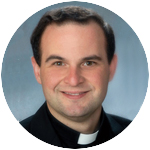
Father Eric J. Banecker
The first in a four-part weekly series on the moral teachings of the Catholic Church, “Called to Holiness and Mission: Reflections on Christian Moral Living Today.”
***
During the course of his long pontificate, St. John Paul II authored many encyclicals, apostolic exhortations, and homilies. One of the most important is an encyclical called “Veritatis Splendor” (“The Splendor of Truth”) on “fundamental questions of the Church’s Moral Teaching.” A theologian would categorize the subject matter as “fundamental moral theology,” a branch of theology which considers, essentially, the basic building blocks of human acts.
Before discussing the content of human acts themselves (often discussed in terms of the Ten Commandments, the virtues, and the Beatitudes), we first have to get some basic rules down for all human acts. There was great wisdom in addressing these questions in an encyclical, for I believe that while many people at least have some sense of what the Catholic Church teaches regarding certain specific actions, many are lacking in this foundation which allows them to evaluate human acts in general.
[tower]
I admit I was quite fuzzy on some of this stuff until my formal theological training. Yet a clearer understanding of these “fundamental questions of the Church’s Moral Teaching” would probably help many people, as it did for me.
“Veritatis Splendor” begins with a reflection on the famous story of the young man who comes up to Jesus, kneels down, and says, “Good teacher, what must I do to inherit eternal life?” (Mk 10:17; cf. Mt 19:16, Lk 18:18). We are struck by the immediacy and seriousness of the man’s question. After all, we must never forget that our time on earth – no matter how long – is infinitely short when compared with eternity.
This young man already has the maturity to recognize that he would not go on living forever as he had. He recognized that sooner or later, he would die. For a Christian, this should not be depressing, believing as we do that Christ has conquered death. Nevertheless, the reality of death is a call to responsibility now, because our actions here on earth have eternal consequences. As John Paul II states, “the question is not so much about rules to be followed, but about the full meaning of life” (VS 7).
Here we come immediately to the heart of moral life, acknowledged by so many diverse philosophies and religions: evil is to be avoided, and the good is to be done. This is the fundamental principle of morality. Every other insight of philosophy or theology as it pertains to human action is based on that principle. And yet immediately we come upon a dilemma: who decides what is good and evil? After all, we are presented with wildly different accounts of the good life.
In our current environment, so many basic aspects of life are being called into question. In this environment of relativism, many believe that any action is acceptable so long as it “neither picks my pocket nor breaks my leg,” to use Thomas Jefferson’s famous formulation. But this is an incoherent concept of human freedom. In fact, this isn’t freedom at all, but mere license.
Human beings are free not so we can do whatever we like; rather, we are free so that we may choose what we ought to do. Indeed, as persons made in the image and likeness of God, endowed with an intellect and rational will, the proper way to live is something what God sets out for us, not something we can decide for ourselves. As John Paul II writes, God’s instruction to the man and woman in Genesis “teaches that the power to decide what is good and evil does not belong to man, but to God alone” (VS 35).
This is the great tension of Genesis: human beings are created in the image of God, but on their own, they don’t actually know how to live in such a way. They must learn how to walk with God and receive this teaching from him, as they slowly conform themselves to his will. However, the man and woman quickly grow impatient with this divine pedagogy. Their wills stretch beyond what they know to be good. They presume to be the arbiters of good and evil. And in this we come upon the essence of the Fall.
As a result of this decision, Adam and Eve’s descendants share in a reality the Church calls “original sin.” And we see the effects of original sin all around us: from wars and violence on our streets to exploitation of children and neglect of the elderly and disabled.
Deciding for ourselves what is good and evil doesn’t make us any happier; in fact, it only leads to greater misery and isolation. But Christ came among us to liberate us from our ego and to incorporate us by grace into the very life of God. In him, humanity has a new beginning. From him, we find the answer to the rich young man’s question.
***
Father Eric J. Banecker is pastor of St. Francis de Sales Parish, Philadelphia.



Share this story